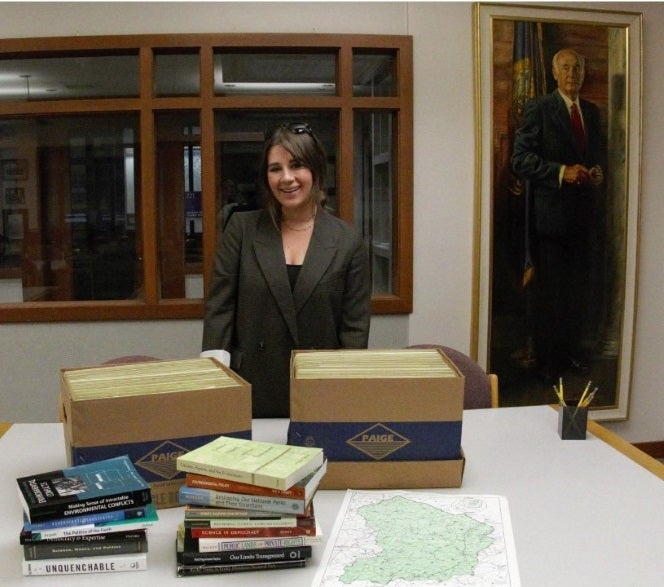
John Freemuth, who died in 2020, was the Cecil Andrus Endowed Chair of Environment and Public Lands in the School of Public Service.
Rachel Klade, a graduate student of history spent a summer internship processing Freemuth’s collection of papers for the university’s Albertsons Library. This is her account of the experience.
Processing the John Freemuth Papers
If you are interested in anything from public land policy to national forests and parks to the controversy surrounding sage grouse, my guess is that you have heard of John Freemuth. An expert on public lands, especially those in the West, John taught at Boise State in both the Political Science and Public Policy and Administration departments from 1986 until his passing in 2020. He also served as the Cecil Andrus Center for Public Policy Endowed Chair of Environment and Public Lands.
I recently spent a summer internship processing the John Freemuth Papers in Albertsons Library’s Special Collections and Archives. The internship was funded by the John Freemuth Legacy Fund. The collection contains a variety of materials – articles, reports, writing projects, research notes, conference materials, awards, and coursework – relating to his extensive research interests and teaching activities at Boise State. The collection also includes several boxes of annotated books that John used for his work. The collection is particularly strong in showcasing his research interests, which include, but are not limited to, public lands, federal land management, sage grouse, ecosystem management, fire policy and management, climate change, water policy, and the role of science within politics and policies.
The collection reveals John’s emphasis on collaboration. Much of his research and writing focused on fairly controversial subjects, such as issues surrounding sage grouse and their habitats or the struggle between state and federal land management, and John often concluded that collaboration between all parties involved is essential for any possible solution. John recognized the necessity of taking multiple perspectives seriously when addressing issues and seeking solutions, which not only provides insight on John’s ideas of the decision-making process but also serves as an important reminder to anyone in a position of decision making–policies must be grounded in collaborative practices.
Although I did not have the good fortune of meeting John, the collection made it clear that John was not only dedicated to his teaching and scholarship but also to serving the community. The countless speaking engagements John participated in demonstrated his commitment to being an educator inside and outside the classroom. The collection contains a series related to the conferences and speaking engagements John attended, which consists of conference materials and numerous “thank you” notes and letters sent to John over the years. Reading these letters, sent by both professional associations, local schools, and his students, provides a glimpse at the lasting impact that John and his expertise had on the people he met.
One of my favorite findings while processing the collection is a document of the original job posting of the open professor position at Boise State that had a start date of August 25, 1986. Underneath the printed job listing is a handwritten draft of John’s cover letter. Many recent graduates can relate to the feeling of uncertainty regarding what happens after graduation, especially in regard to finding a job. I imagine John had similar feelings of anticipation as he finished the final year of his PhD program and the hopefulness he experienced when he sent in his application to Boise State. Interestingly, the job description mentions that the position was only to replace a faculty member on leave for one year. We can only wonder if John had any idea that his time at Boise State would extend well beyond a year and turn into a 34-year career at the university.
In addition to processing the collection, I developed a bibliography with the hopes of capturing the many publications that John both wrote and was cited in. However, I quickly discovered that it may be impossible to capture every citation, which just further indicates the breadth of John’s expertise and impact. John’s legacy continues through his numerous written accomplishments, which continue to be referenced in scholarly journals, newspapers, and podcasts, as well as the many individuals he mentored. The John Freemuth Papers will also continue his scholarly legacy, granting researchers access to his personal writings and insight into his research methodology.
If you’re interested in the John Freemuth Papers, visit Albertsons Library’s Special Collections and Archives, located on the second floor of the library, or email them to make an appointment.